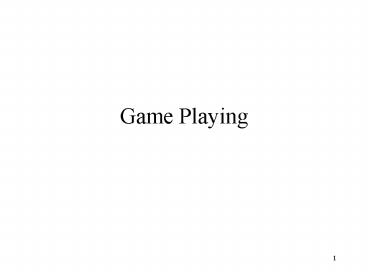Game Playing - PowerPoint PPT Presentation
1 / 21
Title:
Game Playing
Description:
Perfect Play. Resource Limits. Alpha-Beta pruning. Games of Chance. 3. Games vs Search problems ... algorithm for perfect play. finite horizon, approximation ... – PowerPoint PPT presentation
Number of Views:67
Avg rating:3.0/5.0
Title: Game Playing
1
Game Playing
2
Outline
- Perfect Play
- Resource Limits
- Alpha-Beta pruning
- Games of Chance
3
Games vs Search problems
- Unpredictable opponent
- use contingency plan
- Time limits
- only approximate solution
- Approaches
- algorithm for perfect play
- finite horizon, approximation
- pruning to reduce costs
4
Types of Games
5
Tic-Tac-Toe Example
6
Structure of a Game
- Initial State
- starting configuration and whose move
- Operators
- legal moves
- Terminal Test
- Checks if game is over
- Utility Function
- Evaluates who has won and by how much
7
Minimax
8
Minimax Algorithm
function MINIMAX-DECISION(game) returns an
operator for each op in OPERATORSgame do
VALUEop lt- MINIMAX-VALUE(APPLY(op, game),
game) end return the op with the highest
VALUEop function MINIMAX-VALUE(state,game)
returns a utility value if op
TERMINAL-TESTgame(state) then return
UTILITYgame(state) else if MAX is to move
in state then return the highest
MINIMAX-VALUE of SUCCESSORS(state) else
return the lowest MINIMAX-VALUE of
SUCCESSORS(state)
9
Properties of MiniMax
- Complete ?
- Yes (if tree finite)
- Optimal ?
- Yes, against optimal opponent
- Time Complexity ?
- O(bm)
- Space Complexity ?
- O(bm) (depth first exploration)
10
Resource Limits
- Time complexity means given time limits
- limited choice of solution
- Approach
- cutoff test (depth limit)
- evaluation function (estimate of desirability of
position)
11
Evaluation Functions
- Normally weighted linear sum of features
- Eval(s) w1f1(s) w2f2(s) .. wnfn(s)
12
(No Transcript)
13
Cutting off search
- MinimaxCutoff identical to MinimaxValue except
- TERMINAL? Replaced by CUTOFF?
- UTILITY replaced by EVAL
- In practice if bm 106, b 35 gt m 4
- 4-ply - human novice
- 8-ply - typical PC or human master
- 12-ply - Deep Blue, grand master
14
Alpha-Beta pruning Example
15
Properties of Alpha-Beta
- pruning doesnt effect final result
- Ordering improves efficiency of pruning
- perfect ordering, time complexity O(bm/2)
- doubles depth of search
- In practice, time complexity O(b3m/4)
16
Alpha-Beta Algorithm
function MAX-VALUE(state, game, alpha, beta)
returns the minimax value of a state
inputs state, current state in game
game, game description alpha, the
best score for MAX along the path to state
beta, the best score for MIN along the path
to state if CUT-OFF(state) then return
EVAL(state) for each s in
SUCCESSORS(state) do alpha lt- MAX(alpha,
MIN-VALUE(s, game, alpha, beta)) if alpha
gt beta then return beta end return alpha
17
Alpha-Beta cont.
function MIN-VALUE(state, game, alpha, beta)
returns the minimax value of a state
if CUT-OFF(state) then return EVAL(state)
for each s in SUCCESSORS(state) do beta
lt- MIN(beta, MAX-VALUE(s, game, alpha, beta))
if alpha gt beta then return alpha end
return beta
18
Deterministic Games
- Checkers-
- Chinook, 1994
- Chess
- Deep Blue, 1997
- Othello
- computers too good
- Go
- computers too bad
19
Non-deterministic Games
- Chance adds difficulty
- dice roll, deal of cards, flip of coin
- ExpectiMax, like MiniMax
- with additional chance nodes
20
Backgammon
21
ExpectiMiniMax
- expectimax(C) sumi(p(di) maxs(utility(s)))
- C chance node, di dice roll
- p(di) probability of roll occurring
- maxs(utility(s)) max utility possible after dice
roll - Time Complexity
- O(bm nm)
- makes problems even harder to solve

